
13 thoughts about Series 12
- The Lone Barrowman
- Chaos Reigns
- O No
- Reasonable People
- The Toymaker Would Approve
- Wheeee
- From The Top
- The Bare Minimum
- Epic Speech Moment
- The Pointless Child
- O Well
- And The Particle Of Death
- Doctor In Content
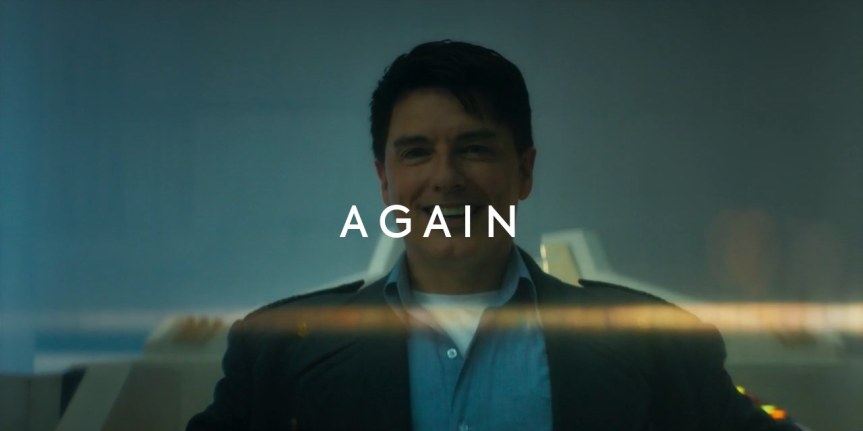
The Lone Barrowman
No, he’s not in the finale. No, the fact he’s teasing the finale doesn’t mean he’s involved in it. No, the narrative of the episode/season wouldn’t meaningfully change if he was removed…no, he doesn’t do anything especially distinctive other than kiss Graham (non-consensually, yeah?) and mistake him for the Doctor (like multiple other characters have).
Look, yes, it is a trailer. It is a trailer for a future episode, to air at some point. Could even be this year. It is a trailer for the presence of this character in a future episode.
Yes…yes…you can barely see him, because the room is so dark and everything is so blurry that he looks like an amorphous vision out of a waking nightmare. Nobody’s perfect. Do you realise how hard it is to get someone to look like they did ten years ago? His hair is white, for god’s sake.
People worked on this scene, you know. They probably had to rush it as well – get in and out very quickly, with very few personnel, so as to keep the whole thing as hush-hush as possible. The audience had to be surprised on seeing this trailer, this advertisement. Furthermore, integrating the scene into an actual narrative with tangible impact on other scenes would’ve risked a leak getting out. Hence all the teleporting characters back and forth. Would you really want to be spoiled on the fact Jack returned?
Jack returned, guys! Jack is back! Didn’t you miss him?
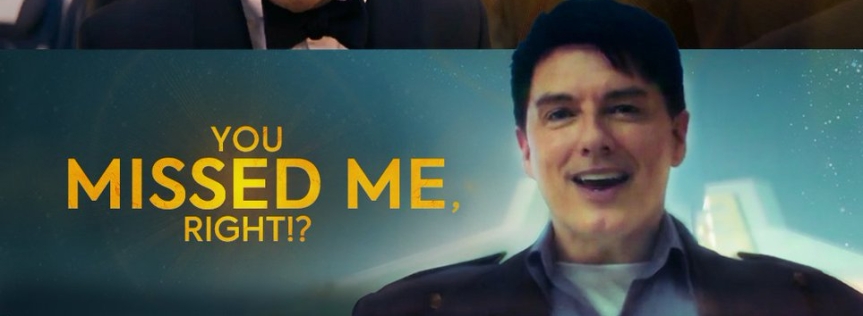
Wasn’t that an amazing surprise? Yes…yes, we know the actual payoff of that surprise is still set for an unannounced later date…can’t you just be patient? They only just brought Jack back and you already want him to matter? To appear in a story of substance? Can I suggest you go watch Children of Earth or something instead?
Be reasonable. He’s been off the show for ten long years! There can be no greater indignity. Surely his mere presence on screen, with the promise of more later, is enough to satiate all you ardent fans? I mean, just look at it. They’re bringing back the Who you like! Look!
You wanted this. You whinged when Series 11 went with all-new characters. You complained when Resolution teased the return of UNIT and then didn’t deliver. How about you take the goddamn olive branch when it’s offered, hmm? Just get excited, alright? Are you really going to sit there and moan about stories allocating screentime to advertising future ones? You don’t seem to mind when Marvel does it.
Why don’t you appreciate the gift you’re being given here? Doctor Who is bringing back Doctor Who. And you love Doctor Who, don’t you? You’re going to keep watching Doctor Who, aren’t you?
I thought so. That being the case: sit down, shut up, and eat the slop. You pigs.

Chaos Reigns
When an unfinished episode somehow makes it to screen, it’s more sad than it is annoying. Picking on it is like kicking a wounded animal. Sure, it’s someone‘s fault, perhaps even a long chain of people’s faults, that the Dreg costumes were blatantly not ready on time and we don’t see them do anything as a result – barely ever seeing one in shot with characters other than the Doctor, their presence occasionally faked with some suggestive editing or dodgy CGI – but it’s not like anyone wanted it this way.
The chain of fault may perhaps be shorter when it comes to Orphan 55‘s script having the conceptual polish of…not so much a first draft as a series of notes scrawled on a napkin. Character motivations and plot twists worthy of a pisstake are doled out with agonising po-facedness. (“She never came to any of my birthdays!”) Instead of ending, the story simply stops – the script itself stops mid-sentence, hoping a shot of a roaring Dreg will provide a decisive closing statement instead.
But identifying O55 as “the rushed one” serves to mask the truth, which is that it’s merely the most blatant symptom of a vastly more pervasive crisis. After all, it’s not as though this is the only episode in Series 12 where crucial things happen off-screen, incidents and motivations seem crowbarred in, characters simply disappear, or the conclusion is swallowed like an afterthought as the script races to somehow reach its final page.
It’s just the one with Space Greta Thunberg – as the BBC youtube channel put it – and BENNI.
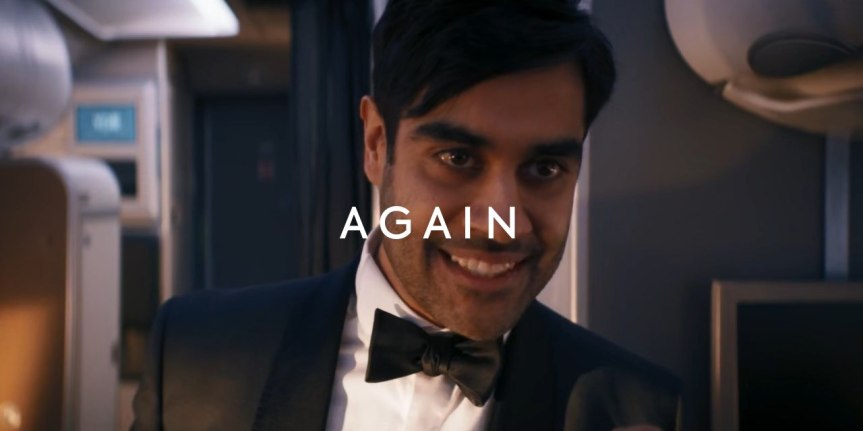
O No
Conspicuously Unpromoted Guest Star repeatedly insisting that he’s a slow runner, so the Doctor can notice this contradicts a detail from a file she read off-screen (and this can be played like a cleverly structured plan by a mad genius, rather than a goldfish’s notion of how to write television), launches us into Chibnall’s brave revival of a character who was dealt with really, really well a mere two seasons ago.
Like Jack showing up to babble about nanogenes and Lone Cybermen, the Master is given a somewhat reductive portrayal. His motivations in Spyfall are vague at best, appearing to want the Doctor dead but secretly wanting her alive so she can get the Lore Bomb waiting for her at the end of S12. He’s helping the Kasaavin take over Earth, which somehow relates to Lenny Henry turning people’s DNA into hard drives (search me), but it all runs together into a soup of horny hamminess and Master clichés. Obviously it’s not a coincidence that we’ve had the dom/sub-inflected take on the Master-Doctor relationship before (“use my name…”), as well as the ranting maniac idiot take on the Master’s personality; nostalgia is the basis of seemingly everything this season attempts.
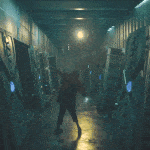 But by The Timeless Children, when Sacha Dhawan – an actor I’ve wanted in Who for ages and would be delighted to see cast as the Doctor – is standing around in a wig giving a two-minute monologue to a CGI blob that culminates in making a series of Goofy noises then screaming “DINNAAAAAAAAAAAHHH” into the camera, or standing around (still in a wig) bragging about magic Cybermen on a Gallifrey set…or staring longingly into the Doctor’s explosive dildo while begging her to kill him…or – oh god I’d repressed the memory until this exact moment – saying the word “Tecteun” over and over and over during the voiceover equivalent of an interminable lore text file in a video game…it’s apparent that nostalgia does not always come with respect included.
But by The Timeless Children, when Sacha Dhawan – an actor I’ve wanted in Who for ages and would be delighted to see cast as the Doctor – is standing around in a wig giving a two-minute monologue to a CGI blob that culminates in making a series of Goofy noises then screaming “DINNAAAAAAAAAAAHHH” into the camera, or standing around (still in a wig) bragging about magic Cybermen on a Gallifrey set…or staring longingly into the Doctor’s explosive dildo while begging her to kill him…or – oh god I’d repressed the memory until this exact moment – saying the word “Tecteun” over and over and over during the voiceover equivalent of an interminable lore text file in a video game…it’s apparent that nostalgia does not always come with respect included.
Dhawan recalls at 1:06:23 in this podcast how the production team were so misleading with him on whether he’d have to learn said three-minute monologue off by heart, how on earth it was going to be filmed and if it would even be used, that it took Whittaker personally intervening to ensure it stayed in voiceover (as scripted) and he could comfortably do the take. When production chaos is so pervasive that even superb actors feel lost, the actual written characters aren’t likely to be faring much better.

Must we sugar-coat it? Okay, the Master has been ridiculous before; not just his electric-zombie turn in End of Time but any Ainley story that isn’t Logopolis or Survival. Oh, and the TV Movie. Yet that doesn’t seem to me a good excuse to regress a character one decade, let alone several. I’m avoiding any direct comparisons to Missy, because I think those all speak for themselves, but his “complexity” has reverted back to “really hates the Doctor/obsessed with the Doctor” with a streak of “he looks sad about it every now and then” and a dash of “death wish, because he’s DAMAGED!“.
The way in which this all ultimately intersects with the Lore Bomb? He’s mad because it means he has Doctor cooties. Mad enough to nuke Gallifrey (a whole other can of worms). Mad that the Doctor is special now – he just seems to have no raison d’etre outside of reacting to things about the Doctor, being a feeble vehicle for the Lore Bomb to create dramatic circumstances. His desire to ‘break’ the Doctor suggests an insecurity about how inferior to her he feels inside, magnified by finding out she’s something even more immortal than a Time Lord, but his actions entail confirming this for her and sending her on a journey of literal self-discovery. She ends up flat-out gloating to him about having infinite incarnations by the end, though the less said about that the better.
Amid all this, the Master’s reduced to a character who is evil “just because he is that way”, rather than out of any clear pursuit, belief, circumstance, ideology, desire, background, experience…He talks endlessly, but what does this guy think? He keeps bringing up “the history between us! The rage and pain in my hearts!” but…what do those non-specific things actually mean to him? It’s vague. It’s incoherent. It’s boring.

And, oh hell, let’s go for the Missy shoutout anyway. Moffat interpreted the Master as an eminently sane Time Lord, brilliant and bored in a post-Time War universe, for whom closeness with her equally brilliant old friend offered to make life interesting – were it not for the Doctor’s naive insistence on treating all those silly lower life forms as real people rather than mere playthings. Her goal was to elevate their relationship, close that long-held gap between the two of them, by making him realise his own potential – cross the line, see things the way she saw them, let go of his damnable ties to humanity. She had a self-serving point of view that made perfect sense to her. Her bananas act was precisely that; a performance intended to freak people out, and one that would often drop to reveal the ennui beneath. In her final story arc, we saw her succumbing to the Doctor’s influence through prolonged contact with him; beginning to see how his outlook truly lent meaning to his life, and could perhaps do the same for hers. This was in 2017.
We’ve had a downgrade.
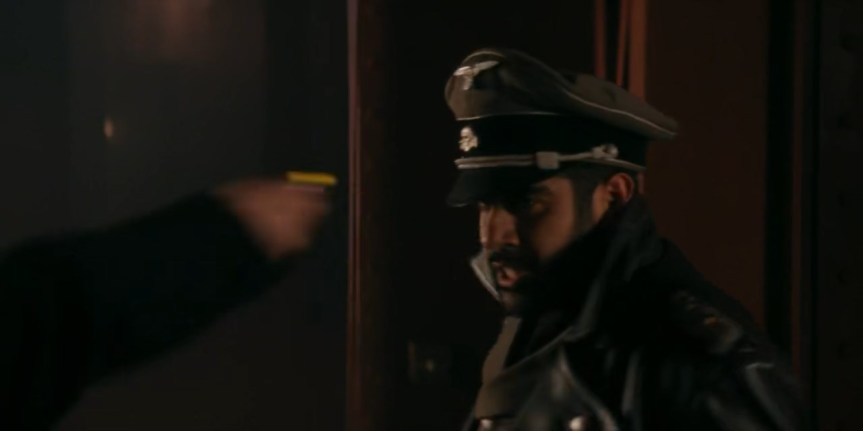
Reasonable People
Mired in the depths of a real-world conflict that saw unimaginable cruelty on a mind-boggling scale and countless lives obliterated, the Doctor’s big statement is “These are the dark times, but they don’t sustain, darkness never sustains”, and it makes you wonder what the point was. Not the point of her non-specific platitude, but the point of any of it. Was it, in fact, the Doctor ensuring that the Master had no sci-fi whiteface before handing him to the Nazis? Or was it, tragically lost to us now, the scene of Noor Inayat Khan’s horrific execution in a concentration camp? (Chibnall confirms on the commentary that this was intended to go after her mind-wipe; it was removed in the final cut for “balance”. He neglects to explain how it got that far.)
The unrelenting question is “why”. Why, why, why. And yet it is not a question anyone involved seems to have really asked, at least until the editing suite, by which point it was far too late to achieve a coherent piece of television. How does any of this Nazi entanglement mesh with what is otherwise a slab of cheese wherein we laugh at Graham tap-dancing, the Doctor’s ability to Blink her way out of a cliffhanger, a ranting tech CEO, Ryan being written like an infant (“I decided my spy name would be Logan and now I’m worried I don’t look anything like Hugh Jackman”), and unreconstructed James Bond nostalgia?
Are we trying to draw links between espionage, technocratic capitalism, and fascism? That sounds like the basis of a quite good hypothetical story, albeit a conceptual balancing act the likes of which we haven’t seen since Season 26. Something like Fenric or Ghost Light weaves together dizzyingly huge metaphors with fierce observations about history; cultural and psychological forces erupt into monstrous symbols, playing out micro- and macrocosms of real struggles. These stories are practically drunk on ideas, revelling in parallels. They make points – about the unsustainability of blind faith in manipulating forces, be they gods, the ruling classes, or Doctors; about the evils of trying to repress and freeze an ever-evolving world – through story and character arcs, rather than simply having someone say them. The sheer ambition at work is tangible.
Whereas if we gave Spyfall credit for doing some multi-layered critique of British imperialism, we’d just be embarrassing ourselves. The story looks like nothing so much as an accident, a quirk of production, a splatter of ideas, multiple drafts Frankensteined together into an approximation of a parody of a Moffat story (as half-remembered by someone who hates him). It wraps up with the Doctor wiggling some technobabble junk off-screen in the past while the Fam and the Master stand around in an empty warehouse doing absolutely nothing, followed by the secondary antagonist abruptly waltzing off-stage and out of the narrative. The Doctor struts in to heroic music with Noor and Ada Lovelace, then plays a convenient recording for the Master’s current alien co-conspirators of that time he told her in detail how he was planning to backstab them.
This story is gibberish. A two-hour-long mess, a shambles of loosely connected stupidity. And most of the time, that would only inspire ambivalence. Nothing wrong with a silly, funny, pointless story, right? I find Graham’s soft-shoe shuffle as amusing as the next guy.
The problem arises when you try to also make it about Nazis…when you give the Doctor wisecracks about how the Master is “not exactly the Aryan archetype”. When our first ever scene of a Time Lord experiencing racism is, er, [checks notes] her making sure he gets the full brunt of it by deactivating his whiteness illusion before framing him as a spy (forcing him to “live through the 20th century”; later on he strongly alludes to the possibility that he had to escape from a concentration camp). The problem arises when you aren’t sure whether to include a recreation of your historical guest character being shot dead at Dachau, or just give her a quick memory wipe and drop her off with some nice words about how fascists never win.
These things are not toys. You can get away with a lot in Doctor Who, provided you know how much distance to maintain – Let’s Kill Hitler uses Nazi-era Berlin as little more than a playground full of one-dimensional bastards for the main characters to humiliate – but something about Spyfall‘s oblivious dalliances with racist cruelty, sprinkled into what’s largely a played-straight Curse of Fatal Death, really rankles. The disrespect doesn’t even feel intentional. It’s just a product of thoughtlessness, the assumption that things being tangentially relevant justifies them being tossed into the script. An insistence on cramming things in without any barometer for whether they serve a purpose beyond being audiovisual noise. Look, everyone, the Master’s swaggering about dressed as a Nazi! But he’s not white…! Haha, isn’t that funny! Guys what if huge tech companies are actually untrustworthy? You know what else is technology? Computers. Ada Lovelace. Smartphones. Gadgets. James Bond. Car chase! Yes…yes…brilliant! BEST EPISODE SINCE WATERS OF MARS! Wheeeeeee!
I’m so tired.

The Toymaker Would Approve
Hold on. Are you telling me you didn’t clap when the Celestial Toymaker was namedropped?
Does it not excite the hairs on the back of your neck to witness the lustrous mohawk of a newly reintroduced Judoon captain?
Surely you gasped in awe when we witnessed the fate of Gallifrey (again) in Spyfall Part Two, or welcomed the beloved Jack Harkness (back) to the screen, or cast eyes upon a(nother) new variant of Cyberman? And of course, who could forget the surprise comeback of the champion sprinter himself, the Master?
Returning…returning…it is returning through the dark. Everything returning. Doctor Who is bringing back Doctor Who. Look down a list of the most revered moments from Series 12 – the official social media will help with that – and returns seem to be a theme. Even Ruth, a nominally new concept, represents the return of the “secret Doctor” twist from 2013. What is the “have a blast of this, Matrix” scene if not hundreds upon hundreds of tiny returns? Look, there’s a Sea Devil…there’s Tennant…

And yet it stops there.
The viewing figures get a conspicuous bump for the return of the Judoon and Jack, but instantly fall off again afterwards and keep sinking. People aren’t going mad for anything the Doctor and the Fam say or do, any aspect of their journeys or presence. No, not even Ryan’s epic series-spanning arc of improving his basketball shots. Only the callbacks to things we recognise seem to generate any interest.
Yet even those stop dead in their tracks. The iconic Jack moment extends about as far as his introductory shot – “you missed me, right?” Not any of the bits where he groans about nanogenes in a Kermit voice, not the arc tease about a Lone Cyberman fated to be miniaturised, and definitely not the bit where he feebly promises to return in a tangible capacity someday.
The only new thing the Judoon do is get horrifically mutilated by Ruth (a moment which, to be fair, I did love). The penultimate episode’s cliffhanger is a repeat of the first’s, namely the Master just popping up again – worth noting that the last THREE times this cliffhanger was used pre-S12, it also had the Master do something of enormous narrative significance – because popping up is apparently his only shock tactic now aside from dumping lore. Er, and Nazi cosplay.
One starts to wonder if these returns really deserve to be fetishised to the extent that they are. Or is that all Doctor Who’s for now? A delivery mechanism for itself? Bringing things back just so we can say we did? What is this, the news feed on bigfinish.com? Are we really happy for Zellin to have a reference to an unbelievably shitty Classic serial instead of interesting motivations? Do we delight in merely hearing the word “Shobogan” once more, even if it’s stripped of its prior context and significance? (And was it really worth–no, not yet…we’ll save the worst for last.)
There are only a handful of reasons for a show to ever become reliant on returns in the way Series 12 is, let alone such superficial ones. Most of them do not indicate good health. Amid this haze of the past, the show’s present existence seems to become cloudy, perhaps even a wisp of smoke dissipating in mid-air.
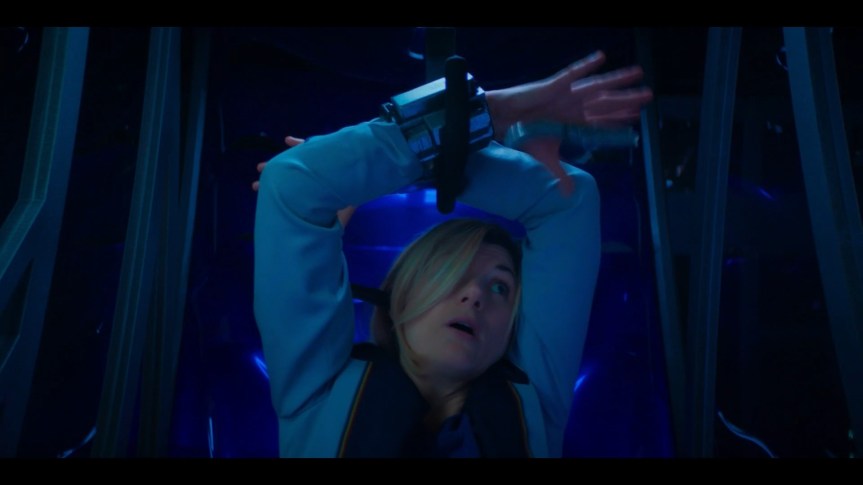
Wheeeee
After being monologued at by the baddies and imprisoned, after the companions have had their character-revealing dream sequences (and the Doctor has had an arc tease instead), but before the taming of the Chagaska is achieved off-screen…the Doctor has to pull off a daring breakout. Seeing as this capture-and-escape routine is apparently the main obstacle to her saving the day – how will she get out of this one?
She wriggles and jerks; the sonic pokes its head sullenly out of her pocket, but there’s surely no way it can reach her hand. I say again, how will she get out of this one? It’s going to require one of her most ingenious schemes ye–

Oh, it, uh
it flew. So now she can sonic her way out of the prison and the rest of the story is basically donezo. I love dramatic conflict! BTW this episode is about depression and mental illness. I love dramatic unity!
Look. These things happen. They aren’t the end of the world. Sometimes there’s just no time/budget/etc for anything better. But when a series released in 2020 is resorting to beats as ropey as anything Classic Who tried to get away with, if not moreso, at a certain point we have to stop pretending this is successfully produced television. Even if you loved every episode of Series 12, I struggle to believe you can look at the above gif and think “there is nothing wrong at all behind the scenes here”. Chibnall and Strevens were waxing on and on in 2018 about how they had to make the show appear competitive alongside the high-budget offerings of services like Netflix, Amazon and HBO; currently we’re hitting standards unworthy of CBeebies.

You can argue, “well the sci-fi hijinks aren’t the point of that story, the social message is”. And, for sure – an optimistic look at fighting depression and isolation is a genuinely worthwhile cause. So I don’t think it’s too much to ask that this worthwhile cause be treated respectfully, and explored in an episode that’s not a fucking laughing stock.
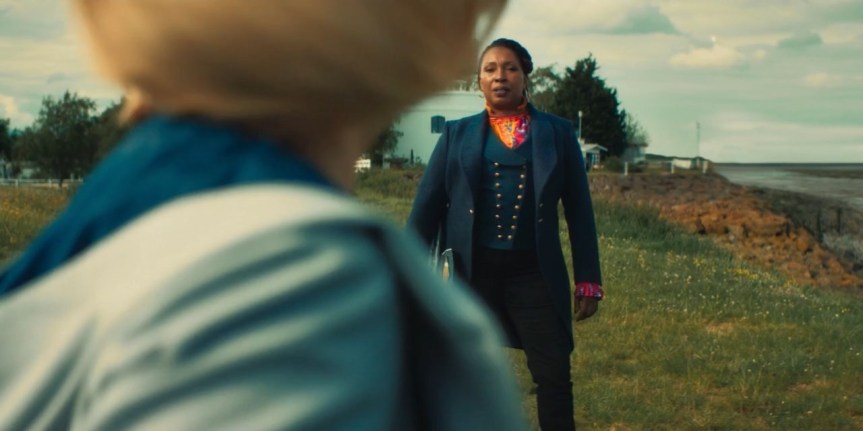
From The Top
Chibnall is as aware as anyone of the inherent sensitivities involved in depicting the Doctor prior to An Unearthly Child; that’s why he’s doing it. Indeed, if we look at how the Fugitive Doctor (henceforth referred to as “Ruth”) is written during her brief and curtailed appearance, we can tell Chibnall is actually gesturing towards an unfamiliar Doctor who hasn’t yet undergone the character arc that forms the early years of the TV series. One that hasn’t even begun to become the Doctor as we understand the title.
Not only is she startlingly quick to mutilate a Judoon, but she draws Thirteen’s ire over how casually she tricks her pursuer Gat into self-obliteration; how easily she’ll wave an enormous gun around to scare off enemies. The idea is clearly that she’s “darker”, more violent, more pragmatic – makes sense enough, given that bit where Hartnell nearly split a caveman’s skull open. So far, so believable.
And then…it falls apart…
RUTH: Recalibrated. Who wants some?
DOCTOR: The Doctor never uses weapons.
RUTH: I know.
Well, actually, no; it fell apart much earlier than that – the moment Ruth broke the glass and popped up with not only a police box TARDIS (the detail which famously soured Ian Levine on this whole concept), but her own flashy adventurer costume, and in general what can only be described as a distinctly NuWho Doctor persona…give or take a few edgy tweaks, which are still well within the scope of what we saw with John Hurt. Unlike Levine, my concern isn’t really about the obtuse continuity of it, but what this all represents.
Go with me for a moment. The idea that there was a “before” for the Doctor, a time when their character was more fluid than the patterns of behaviour and recognisable tics we’ve seen accumulate, is one of the show’s few sources of genuine mystery. Mystique, even. It’s one of those things that hasn’t been claimed yet, that still leaves the character subject to interpretation in the hands of the audience. What’s more, the fact it’s been an intentional question mark since 1963 makes it akin to a little parcel of DNA from that era, a preserved fragment of the original show with all its heady sense of possibility – the show where The Edge of Destruction could jostle alongside Daleks and Marco Polo, or Planet of Giants could actually be produced – surviving all the way into the present iteration of Doctor Who. Such things are ephemeral but beautiful.
So while the prospect of filling this blank with reams upon reams of Chibnall’s fanfiction pleases me about as much as you might expect, the really troubling element is that what’s being pasted in here is just by-the-numbers Doctor Who. A space which could represent almost anything is being used to represent the same, relatively narrow, conception of the Doctor we’ve already been watching for years. It’s a gentrification of the imagination; something that was grounded in the material history of the show and its audience is being tossed out, in order to open up room for an infinite stream of abstract Content that adheres to a particular model.
This is what fans are celebrating when they gush about all possible Doctors supposedly being canon now. Doctors who are all imitations of what came after Hartnell (but mostly of what came after Tennant…), inserted in place of something theoretically unique. Because apparently the Doctor was always just this one way. We’re losing the park but getting a tiny, tiny, tiny sandpit to play in instead. Thanks!
As for what this leaves of Hartnell’s storyline? His evolution into a heroic figure thanks to the contributions of Ian and Barbara? “Well, after being mind-wiped and reverted to a child, he just happened to do all of these Ruthesque things again, see, it still makes sense if you read these pages on TARDIS Data Core…you could say he was fated to do it because, uhh…well he was subconsciously influenced by his memories of his past lives that were bleeding through…well actually it’s just an innate aspect of his essence that he turns out like this no matter how many times he’s mind-wiped because he’s special…it’s all perfectly reconcilable.” We see something very similar in action here too; a story that had somehow, miraculously, survived more-or-less unobfuscated for half a century – even with the additions of Time Lords, Gallifrey, the Hybrid, the Hand of Omega(!) – is thusly assimilated into a stream of endless, unintelligible, technicality-drenched gobbledygook, that invariably misses any sort of point. “Lore”, I believe they call it. This is what discussion of Hartnell’s Doctor is going to be like from now on, unless you actively avoid anyone who treats his era as subject to Chibite reinterpretation. Have fun.
But hey! If Ruth didn’t have a police box TARDIS, or a strident anti-weapons creed (a NuWho invention, let’s not forget), or flamboyant attire, or a predilection to proudly introduce herself to total strangers as The Doctor, then the big reveal wouldn’t have worked. It wouldn’t have been big, because it wouldn’t have been a return. Everyone would just be wondering “who’s this mysterious new character”.
And we couldn’t have that, could we? We couldn’t have that.
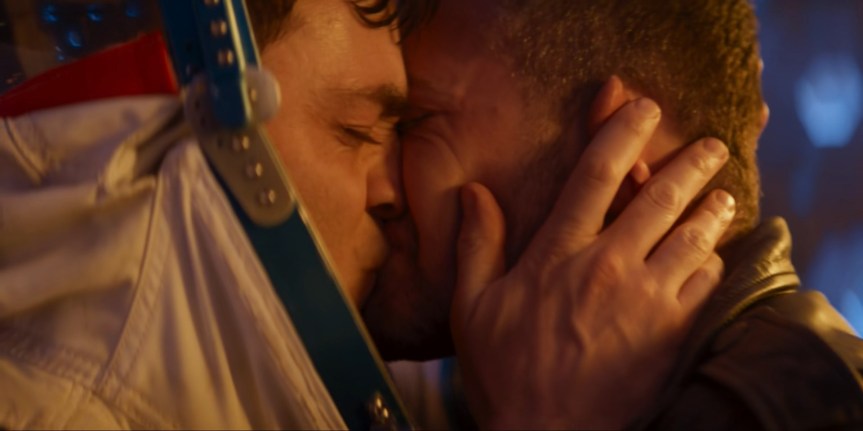
The Bare Minimum
Let’s turn down the snark for a second: it’s good to see a sincere gay love story on Doctor Who. Despite the neverending accusations of an agenda, there’s oddly fewer than you might think. It’s gratifying to see queer intimacy given the same respect as the heterosexual equivalent, queer characters allowed to be as fully-rounded as their straight counterparts. And this time, both characters even survive!
Oops. Snark again. That didn’t last long. Oh well, in for a penny…
As you’ll recall I went into in the Chibshow Resolution blog post, one of the strangest patterns in Chibnall Who is the correlation between being gay and being dead. It seemed everywhere you looked, gay minor characters were popping up only to either die immediately or be recently bereaved. So an episode revolving around a marriage between two men, while welcome, came surrounded by an implicit aura of dread. Which one of them was going to get the chop?
The great irony of the whole thing is that this was the only reason Praxeus‘ climax was at all suspenseful. If not for the established gay-killing predilection, few’d assume a show as generally warm as Doctor Who would be so mean-spirited as to kill off either of the husbands! Only in this brave new era of the programme did it feel entirely up in the air.
So it’s utterly bizarre that their survival, of all things, should feel like any sort of victory for Chib Who. For those of us who’ve been a bit cheesed off by the whole issue, even something nice can’t help but feel tainted by the context. This is a long-winded way of me admitting I spent most of Praxeus’ finale actively hoping for it to become the most appalling entry yet in the dead-gays streak, if only because it might stir a few more people into noticing (and be absurdly hilarious. I’m gay, I can say this).
Nonetheless, in light of the gays actually getting a happy ending for the first time since The Doctor Falls, the real risk is in giving this story more credit than it really deserves. In a vast desert, even a droplet of water feels like a gift.
If, say, we entertain – as some fans actually have – the idea that the episode revolving around a virus, indeed with scenes of a man watching his husband slowly die of it, can be read as a sly bit of HIV symbolism…signposting that this is secretly a deep story about the gay experience (good luck to whoever writes the eventual COVID ep)…we run into the fact they’re rescued by a technobabble sci-fi cure, and the metaphor screeches to a crashingly crass dead end.
What we tangibly have is a tale of a kinda toxic masc guy who’s afraid of commitment, which could probably have served to emotionally anchor the whole episode, were it not one of those increasingly wearisome “global thrillers” stuffed to the brim with other characters who have barely any work put into them at all, constant country-hopping to pad the runtime, and a torrent of exposition so relentless it forces characterisation to be sequestered off into its own designated scenes.

Every minute spent extending the benefit of the doubt to episodes that are so…slapdash in their attempts to capture the human experience, and contriving to act as though they’re overflowing with subversive meanings from every frame, is time that could be spent doing literally anything else. What’s the harm, you ask? Well, applauding an episode for not murdering gays for once is only the start. Go too far down this road and we wind up at “Thirteen persuading Solitract-Trina in It Takes You Away was a fearless moment of lesbian representation from Whittaker“, a mirror world from which there really is no coming back.
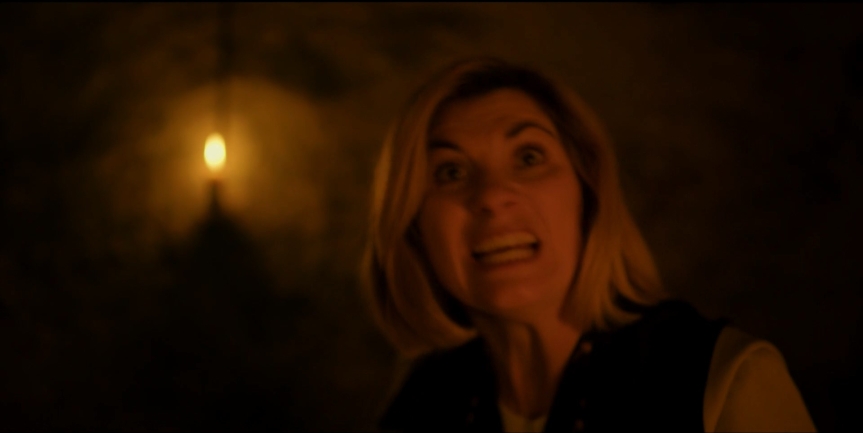
Epic Speech Moment
Truly…this was the moment Jodie Whittaker became President. I mean the Doctor. I believe the saying goes something like that?
One of the most drummed-in traits of the NuWho Doctor is their propensity to give a big speech, often an angry one, so it follows that when Thirteen finally gets her own it’s deemed by many fans to be her defining Doctor Moment. True enough, up until The Haunting of Villa Diodati, this Doctor flipping out and ranting at any of the Fam was pretty much unthinkable. At the very least it shakes up the texture of the show, right? (Giving your main characters things like interpersonal conflict will do that.) But before we lose our heads too much over this epic scene, we should take a step back and listen to it.
YASMIN: Don’t let the Cyberman have what it wants.
DOCTOR: I know, because armies will rise and billions will die.
GRAHAM: Shelley’s going to die if that stuff stays inside him.
RYAN: Shelley’s only one life against all those others.
MARY: What are you saying? How can you condemn him to death like that?
DOCTOR: But is he, Ryan? His thoughts, his words inspire and influence thousands for centuries. If he dies now, who knows what damage that will have on future history? Words matter! One death, one ripple, and history will change in a blink. The future will not be the world you know. The world you came from, the world you were created in won’t exist, so neither will you. It’s not just his life at stake. It’s yours. You want to sacrifice yourself for this? You want me to sacrifice you? You want to call it? Do it now. All of you. (silence) Yeah. Cos sometimes this team structure isn’t flat. It’s mountainous, with me at the summit in the stratosphere, alone, left to choose. Save the poet, save the universe. Watch people burn now or tomorrow. Sometimes, even I can’t win.
From the outset, changing history is a bit of a foggy thing on which to hang your gigantic moral dilemma, since it inevitably requires the writer pulling made-up rules out of their arse, and often struggles to resonate with anything in particular about real life unless dolloped in metaphor/metafiction (see: Moffat’s run).
Oddly, the scene appears at first to be setting up a perfectly run-of-the-mill trolley problem when Ryan – in one of his endearing sudden douche turns – suggests leaving Percy Shelley to a horrible death for the sake of averting billions of casualties in a Cyber War. But this isn’t followed with the usual Doctor response to such ideas, something along the lines of, “I demand we find another way, I refuse to give up on saving an innocent life, yada yada yada.” The script feels that in order to make this into a Big Doctor Moment, the scene must instead escalate into the conceptual realms of gobbledygook.
So the crux of the Doctor’s verbal smackdown is the danger of wiping out the entire future, including Ryan’s very existence, if Shelley is allowed to die. This logic more-or-less comports with past celebrity historicals, which have from time to time made a point of not letting the celebrity be murdered by aliens.
(I seem to recall 13 and the Fam had a recent one where even letting Rosa Parks get the wrong bus would set civil rights back half a century, so Ryan suddenly being cavalier about murdering a famous literary figure is…indicative of how the Fam have to be written to justify the Doctor going off at them.)
So far, so unnoteworthy, yeah? Not quite – something very weird’s embedded here.
His thoughts, his words inspire and influence thousands for centuries. If he dies now, who knows what damage that will have on future history? Words matter! One death, one ripple, and history will change in a blink.
Within the protecting-history spiel, we find an effort at testifying to the transformative power of artistic expression. Its heart is definitely in the right place, no denying that. Words do matter. (Though I might risk reminding the author of The Ghost Monument that images matter too.)
There’s just one problem with the Doctor’s insistence that one death, one ripple, will obliterate all of history…
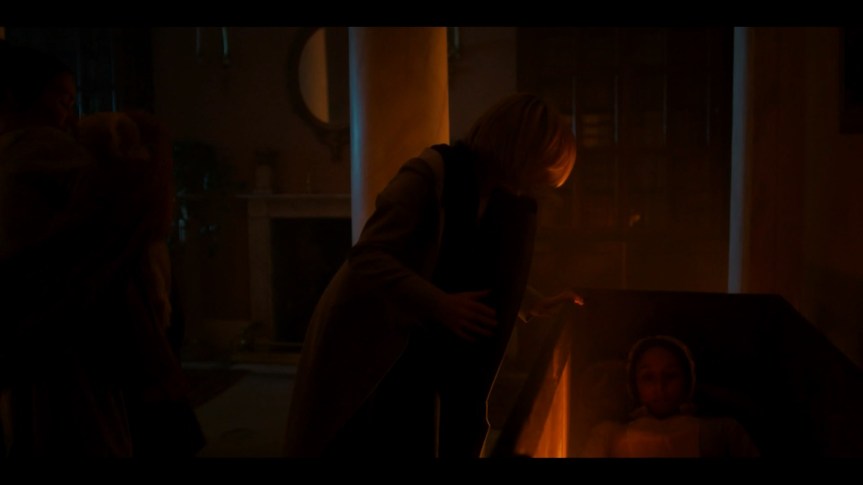
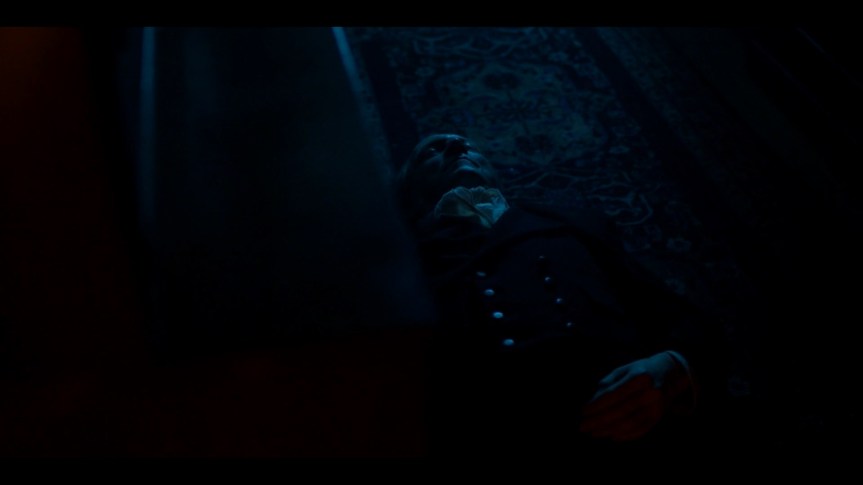
TWO PEOPLE HAVE ALREADY BEEN MURDERED BY A CYBERMAN OVER THE COURSE OF THIS EPISODE. So the exceedingly unfortunate implication here is “they’re servants, nobodies, they would never have expressed anything important or worthwhile, their existences had no impact on their surroundings, thus their deaths don’t even qualify as a ripple”, which is about as classist a sentiment as you’re likely to find anywhere in Who. While presumably accidental, it’s stomach-churning stuff. Fabricated time travel rules tend to end up being unconscious projections of ideology, and this takes the cake – Ryan suggests letting a third person die, and the Doctor’s response is to wax lyrical about how they mustn’t because this one makes contributions to the English Literary Canon upon which all of REALITY literally hangs! And if you don’t meet that qualification you just don’t matter. Questions of humanity, compassion, these things barely seem to enter the moral dilemma equation anymore.
Nor does the content of life itself – Percy, Mary and Lord Byron having a traumatic ordeal with a Cyberman, in which two of the servants are brutally slaughtered, is totally amenable to the preservation of recorded history. It’s just killing them off that would cause an issue. So words matter, sure, but not the contexts that generated them…just the figures who wrote them, who aren’t even treated as products of circumstance but instead merely Special People. And all of history is once again reduced to fetishism of the famous individual at the expense of the wider social reality…but that’s another blog post.
To think, all the off-the-cuff plot contrivances with the Cyberium Blob are deployed in service of setting up this Big Moment. Worth it? It’s beginning to look like just another incoherent splodge of Series 12 madness.
When the Doctor finally reaches her coup de grâce, “sometimes this team structure isn’t flat, it’s MOUNTAINOUS, with me at the SUMMIT, in the STRATOSPHERE, ALONE,” torturing a metaphor to absolute death in order to rebuke the Fam for buying into her flat-team rhetoric (that never, at any point, began to resemble the truth) – the petulant pomposity passes the point of parody. Are we certain it’s not Pip and Jane (RIP) doing the titular haunting? We’ve got “spurious morality” here in spades, but I see no catharsis on the way…
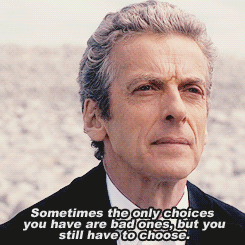
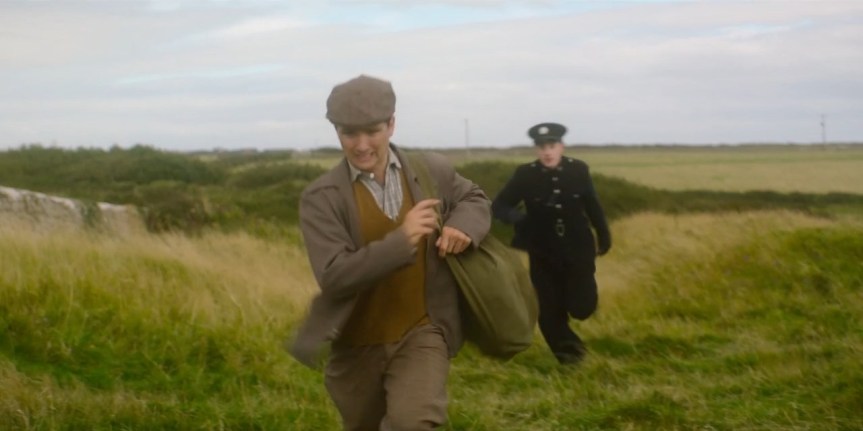
The Pointless Child
I’ve inferred that the highlights of Ascension of the Cybermen, an episode which otherwise contents itself with being a tonal retread of Some Ranskoors Do ‘Ave Kolos, are generally agreed to be the Ireland sequences. These genre-crossing interludes – revolving around a surreal series of events in the life of a ginger policeman named Brendan – are spliced at oblique intervals throughout the story and seem to have nothing to do with it. (Those of us who’d seen the leaks assumed Brendan might be an Irish incarnation of the Doctor.)
They’re cryptic, sinister, and refreshingly short on explanatory dialogue. In other words, they’re like almost nothing we’ve seen in the Chibnall era except perhaps Yaz’s nightmare in Can You Hear Me?. Even their jarring placement is the kind of formal experiment we’ve spent twenty episodes being trained not to expect. Without them, the episode might as well be Chibnall on autopilot, but with them, it actually feels…unpredictable.
So, of course. Of. Course. Of course when the time comes to answer the question of what all this means, The Timeless Children proceeds to let you down in ways previously inconceivable.
DOCTOR: How much was lost?
MASTER: Impossible to tell. It took up a lot of space in the Matrix, though. Yeah. There is one final trace. Those glitches of Ireland you keep seeing. Those images, they were buried deep in the Matrix. Tecteun put a visual filter over it so that no one who watched it would find it remarkable. I transmitted them into your mind as you tracked the Cybermen. Maybe this is the last gift of a parent. A clue. Or an apology. You can decide. Did Tecteun leave these images for you to decode one day?
As with so many things in this wondrous era, there’s both a baffling part to this and an unpleasant part. The baffling part is straightforward: the script casually reveals that the Ireland interludes from last week were visions being experienced by the Doctor during the story, which is incredible because in the space of ten seconds it invents and answers a question that nobody had even the slightest reason to ask. The Doctor didn’t appear to be reacting to the Ireland scenes, or indicate that she’d seen anything out of the ordinary, while she was facing off with Ashad the Cyber-Zealot. As audience members, we were capable of accepting the cutaways as a structural gimmick – this “reveal” somehow retroactively makes Ascension more confusing, not less, while adding nothing. You couldn’t make it up. It’s as though they forgot to film a few takes of Thirteen clutching her head and going, “Ah! My brain! What did I just see?!”, and given how chaotic a production S12 clearly was, I can’t rule that out. These episodes are innovating incompetence.
As for the unpleasant part, that would be the actual premise. Woe betide anyone who assumed Doctor Who might be doing something substantial with Ireland for once. You poor fools, you thought we were going to see an underexplored setting suffused with fantasy intrigue? (Dear God, don’t tell me you thought Chibnall was going to grapple with the turbulent historical context.) Well, never mind, put all that aside, because The Timeless Children helpfully reveals that Brendan’s story was not only fake, but a ruse created to disguise the actual story, which is…erm…Gallifrey lore. Yay?
But why Ireland, you ask. Why would Chibnall even go as far as to specify “Late 1940s West Coast Ireland” in the script? Dunno. Maybe they cast and budgeted for a historical but had to rewrite at the last minute. Nonetheless, the Gallifrey mythos exposition is the point here. We see individual Brendan scenes “unglitched” into their true, Gallifrey equivalents. The Garda station? Oh, right, that was actually the Time Lord Secret Agent Office. Yippee. (At some points it’s clear the Brendan version is a deeply misleading adaptation, such as his confrontation with an armed thief prior to falling off the cliff.)
There’s an assumption that we’ll just stop caring about the Brendan narrative now, that we find new info about the Time Lords more interesting, or satisfying enough to forget that we wasted our time getting hooked by questions like “what’s happening to this unkillable man in Ireland in 1947”. All that curiosity amounts to is a glitch in the Matrix, or Tecteun maybe-possibly doing a favour for the child they experimented on; wishy-washy handwaves.
We’re misled into expecting a story that does its own thing, then we get to watch as it’s promptly dissolved in favour of one that relies on piggybacking Mythic Significance. Somewhere along the line here is a deeply ugly impulse. Mythos is placed on a pedestal, while storytelling itself is treated like a cheap distraction, something to keep the fans abuzz for a week before being thrown out like a used condom. You liked the vision of Doctor Who offered by those strange, lyrical glimpses of Ireland? Too bad. Here’s some prosaic tosh about Gallifrey for you to put on the wiki.
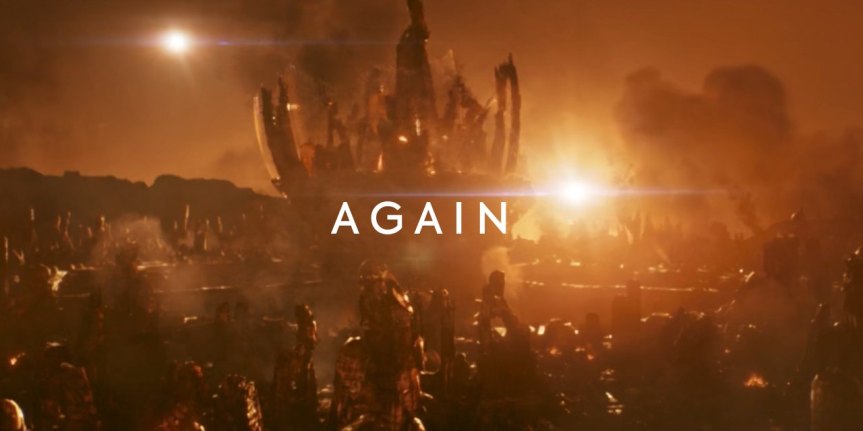
O Well
It’s 2005.
Doctor Who returns to television in a new incarnation, after sixteen years’ absence. The Doctor’s backstory receives an ambitious update; he’s now the sole survivor of his home planet, traumatised by having had to sacrifice his entire species for the sake of the universe.
It’s 2013.
Doctor Who’s fiftieth anniversary. A momentous, 75-minute commemorative episode places the current TARDIS team opposite the most popular new-series Doctor, the most popular classic-series Doctor, a renowned guest actor playing a mysterious ‘secret’ Doctor, and the performer of the most famous new-series companion.
The Time War storyline that began in 2005 is brought back to the fore for an enormous status-quo shift – by working through centuries of torment over their decision to destroy Gallifrey, the Doctors earn a chance to go back and make a different choice. With billions of his people now safely hidden somewhere in the cosmos, and the defining wound of the revived series healed, the Doctor sets out on a new journey; a new man.
It’s 2020.
The second episode of Series 12 involves laser shoes, killer smartphones, and Nazi-occupied Paris. Near the end, the Master (alive and fully evil again for unknown reasons) reveals to the Doctor that, while she wasn’t looking, he completely incinerated Gallifrey and everyone on it. This renders the two of them the last of their species. Again.
The Doctor is down about this for a few days. The next episode is Orphan 55.
…
When they write the history of NuWho, some will cite The Timeless Children as the beginning of the end. Understandable, but incorrect. Timeless is a botched attempt at a big story. Quieter, yet far more fatal, was the earlier point whereupon the entire concept of a ‘big story’ – the idea that the overarching narrative of the show might be worth paying any attention to, ever again – was mutilated. The answer can only be Spyfall.
Consider the development without any of its attendant shock-and-awe.
Chibnall picked up the thread of Gallifrey’s fate, something previously invested with massive emotional significance by Davies and Moffat. Every new development in this thread seemed to require all the mythic weight the show could muster. Moffat’s effort to reverse the original outcome in Day of the Doctor bordered on Herculean, with the aim of opening the door back up for new possibilities (some of which he then pleasantly explored in Time of the Doctor and Hell Bent).
Chibnall began his era free of lore-related burdens – he didn’t have to do anything with Gallifrey if he didn’t want to; he chose to continue that story, that which felt so central for the first ten years of the revival. And with the freedom to do anything, go anywhere his imagination could take him with it, he…
…dismissively flicked the Gallifrey switch back to “nuked”. He wrote a shallow imitation of the status quo from 2005-2013, making sure to remove the key emotional hook (this time the Master nuked it, not the Doctor) and the characterisational consequences (the Doctor’s response this time is summed up by Yaz as a “mardy mood”). It goes on to serve little dramatic function beyond providing a backdrop for lots of shouting about the Timeless Child, and coughing up a truly ridiculous Cyberman makeover.
So what, you say. Who cares about boring old Gallifrey, Doctor Who doesn’t even need all that stuffy baggage! That’s fair, but a lot more has been damaged here than merely a fictional planet.
Doctor Who is now a show where something as seismic as the main character’s entire species – people they fought desperately to save – being slaughtered(!) struggles to even register. It’s less hyped than Ruth popping up. And with good reason. If the switch can be flicked back and forth so casually, surely it’s no more than a decoration, a set of Christmas lights. Who’s to say it won’t be flicked again in two years? The Master can just pop up again doing his same old gimmick, acting like the events of his last meeting with the Doctor simply did not matter (and this is evident even if you stopped watching when Tennant left!). Nothing matters. Things the audience has been prepared for years to view as emotionally significant, they’ve had all meaning drained out of them in minutes. Seconds.
Imagine hearing about any of this as a casual viewer. “Oh, she’s the last of her kind again now, is she? Why don’t they do something new for a change? Back and forth, back and forth, you can’t even keep up.”
It’s a joke. Blowing up Gallifrey again, out of nowhere. How could people be expected to still care after that? It should’ve been laughed out the door at the drawing-board stage! But somehow, everyone involved thought they could limply cannibalise a previous, still relatively recent era, without severely wounding the conceptual health of the show. (Even more incredibly, right after demonstrating that nothing in the metaplot matters anymore…they thought they could get everyone to care about a big new retcon to the Doctor and Time Lords’ origin story. Instead, they got the lowest-viewed episode of the entire revival. Oops.)
By Fugitive of the Judoon, an episode that’s mostly about revealing a secret Doctor (again), we witness the Doctor confronting a villain from Ye Olde Gallifrey, and talking her way out by dumping a load of exposition about how their home is destined for double-obliteration.
I’ve seen Gallifrey destroyed. Twice. First by a war, second by a lunatic who I’m still trying to find. In my time, Gallifrey doesn’t exist. It’s gone. Forever. And if you don’t know that, you’re in my past. So, you are only serving at the glory of ash and bone.
The emotional throughline here is nonexistent. The convolutions have become so pointless, they’re hilarious – the very fact of Gallifreyan characters still toddling around on Earth, just so they can be told they’re going to die…twice…at some point…it defies belief. And just like the “unglitched” history of the Timeless Child, just like Sacha Dhawan’s narration about how “the Shobogans built themselves a Citadel and gene-spliced the ability to regenerate into future generations of Citadel-dwellers but Tecteun restricted the regenerative process to a maximum of twelve times”, you are expected to care purely because these are relayed events from a fictional universe. Because it lays claim to being part of the same “lore” as the show you like. Even though, if we treat NuWho from 2005 to 2020 as one story, it’s obvious that something is wrong. This story, from Rose to at least as far as The Doctor Falls, is often surprisingly cohesive, nuanced, even rewarding. Series 12 abruptly transforms it into one that is coarse, shallow, and deeply, deeply stupid.
Speaking of which:
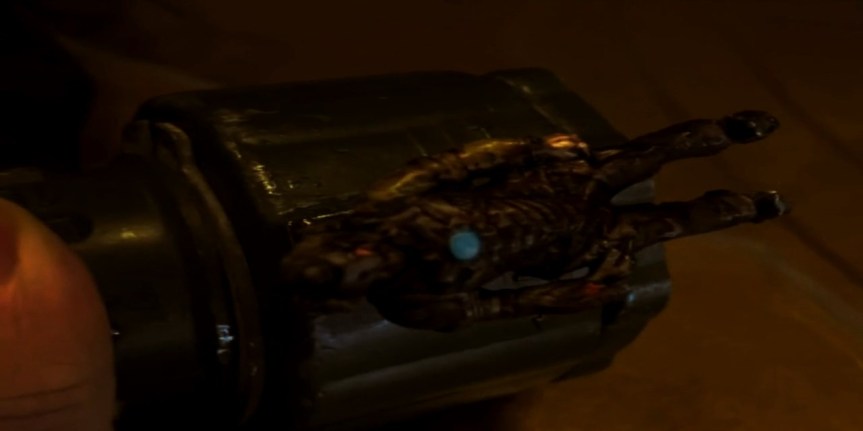
And The Particle Of Death
First off, let’s pretend it was at least named something specific, like…meh, I watched The Invasion recently so let’s go with “Cybermegatron Bomb”. That’s fun. Anyway, to understand the issue of the Cybermegatron Bomb, we ought to work backwards.
The climax of The Timeless Children hinges on a dilemma scenario that loosely apes 2005’s The Parting of the Ways. To stop the villains’ rampage, the Doctor must activate a device that will wipe out all organic life on the planet, Gallifrey in this instance. (Amusingly, the script has the gumption to implicitly compare this to the Doctor’s original nuking of Gallifrey, despite the fact it’s now only populated by her, the Master, and a load of Cybermen with dead Time Lords stuffed inside.) She’s already sent away her companions in an emotional farewell – or at least as emotional as anything can get with this team. The Master is desperately goading her to press the button, craving to see her finally give in and kill him, with the added bonus of killing herself in the process. How will she get out of this one? It’s all been building up to right now.
Ultimately, as in Parting, the Doctor can’t bring herself to use the Cybermegatron Bomb. In Nine’s case it was because he also didn’t want to slaughter the entire remaining human population of Earth with the Delta Wave, while in Thirteen’s case it’s either self-preservation kicking in or her good old no-kill rule, but the parallel is roughly intact.
However…while Nine was rescued from his failure by the redemptive power of Bad Wolf Rose, the companion/TARDIS who loved him enough to intervene, he also had to pay a price. Preserving Rose’s life meant absorbing lethal radiation into himself and regenerating into Ten. On the whole, a neat little character arc.
In The Timeless Children, a heroic old man called Ko Sharmus who was introduced last episode barges back into the room, and babbles the following:
You didn’t start this. I did. I was part of a resistance unit that sent the Cyberium back through Time and space. Though obviously we didn’t send it back far enough. So this is my penance. Mine to finish. My journey ends here. But the universe still needs you, so I suggest you run.
Then he nicks the Cybermegatron Bomb off the Doctor, who looks like she might protest for a second (“No…” “But…”) before legging it outta there and leaving Sharm to his demise. So essentially, the answer to the climactic conflict of the episode is… “if you can find someone else to do the deed for you, who gives a shit?”
Now rewind. That’s the final narrative importance of the Cybermegatron Bomb, but its existence is of course teased much earlier on, in Ascension of the Cybermen. “The death of everything is within me,” boasts Ashad, of his final gift from the Cyberium Blob – oh yes, how could I forget? The Cyberium’s primary impact on the story is that it creates the Cybermegatron Bomb, so we could even say this story thread runs as far back as Haunting of Villa Diodati. Even better – Ashad himself does nothing in the finale other than get miniaturised and reduced to an on-switch for the Cybermegatron Bomb, meaning Fugitive of the Judoon‘s tease about “the lone Cyberman” culminates here too. That’s quite a lot of setup! So we might be expecting it all to lead to something rather significant.
And yet…as the Doctor starts wondering aloud what that mysterious hint from Ashad could have meant, guest characters Ravioli and Salarmi suddenly drop this pearl.
RAVIO: There is a myth around him.
YEDLARMI: The Death Particle.
RAVIO: The legend is, he, it, whatever, has a Particle in a tiny chamber inside its chest. It will take out all organic life on a planet.
RYAN: That’s grim.
“There is a myth around him.” “The Death Particle.” Oh. Thanks! Nobody thought to mention this ‘legend’ until the exact point at which it suddenly became pivotal. For all the world, it plays out as though the writer made this bit up on the spot – including the name, Death Particle, which might as well have been a placeholder name for a particle that causes death – except for the fact that, as we’ve seen, this scenario has been extensively prepared for in earlier episodes. All of that – all of it – leading us to the PARTICLE of DEATH.
And in service of a climax that cops out of its own stakes, using a guest character we barely know, spouting his backstory at the last second. It doesn’t try to grab us, or even interest us. We choke and heave through a treacle-like excess of plot, plot, plot, and yet amid it all there is little-to-no story. No content. No creativity. Not a shred of life.
The whole episode is like this. The season finale, one touted as “changing everything forever”. Ryan achieves a basketball shot. The Cybermen are reduced to rubbish costumes to be worn by Yaz. Graham helps plant some bombs on a ship that feels oddly like Tim Shaw’s from Ranskoor. Nothing matters. It’s a lazy, dull, embarrassing, meaningless runaround. We’re reaching depths of travesty that NuWho has never plumbed before.
You know what’s really funny, though?
This isn’t even the worst part.
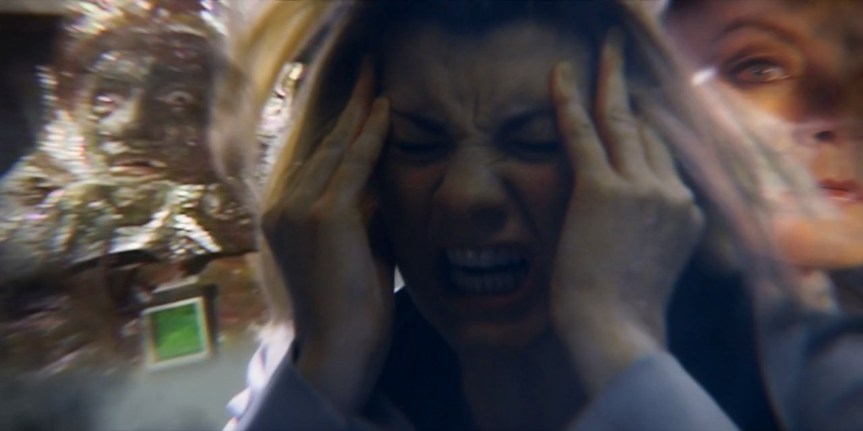
Doctor In Content
There were evil metal creatures
Who tried to exterminate
Inside each of their casings
Was a bubbling lump of hate
We met cybernetic humans
With no feelings at all
Warriors of the ice
Who stood over seven feet tall
In light of her failure to do anything to the Cybermen, and her helpless passivity for most of the episode’s runtime before that point, it could be said that the Doctor only gets one genuine “hero moment” in The Timeless Children. One scene which attempts to make any case for her as the protagonist of the show. I speak of the unforgettable sequence in which she wishes her way out of the Matrix, by conjuring a slideshow of screenshots from the Doctor Who archive. This went down well enough to make it onto the “most ❤❤ moments of Series 12” tweet, natch.

But what does this entail?
What is it saying about her as a character? She’s good at…remembering old episodes? Telepathically blasting stuff? She’s really old?
What is it saying about the past stories it’s invoking? That they exist? That there’s a lot of them?
What about this scene pleases us?
Well, we know, don’t we. They’re showing us old stuff we liked and they’re playing the Doctor Who theme over the top. That’s literally it. That’s all they have to do to secure a new iconic moment of the show; remind the viewers of the past.
For an instructive comparison, cast your mind back to The Eleventh Hour – there, we see a montage of old scenes and Doctors as Eleven introduces himself to the Atraxi. Back in 2010, it’s rare to see such things in new episodes. Smith’s a fresh, unproven Doctor, stepping into huge shoes, and invoking the history of the show helps to ground him as the new inheritor of its lineage. The Doctor wants the Atraxi to see those images, understand them, and thusly fear him. It’s fanservice, but it also tells a story and helps move the show forward.
In The Timeless Children‘s “scronching at the void” version, none of those other elements are present. The intention is that we derive pleasure from seeing recognisable faces, hearing a recognisable song, and patting ourselves on the back for being Doctor Who fans. Isn’t Doctor Who great?
There was a Brigadier and a Master
And a canine computer
Each screaming girl just hoped
That a Yeti wouldn’t shoot her
Doctor in distress
Let’s all answer her S.O.S.
Doctor in distress
Bring her back now, we won’t take less…
Isn’t Doctor Who just wonderful when we take individual bits and pieces from it, divorce them from all context, and subsume them into a stream of raw Content? You don’t need to evaluate them. You don’t need to wonder why. You don’t need to think! All you have to do is fetishise Doctor Who, adore things just because they are Doctor Who. What’s Who is good; what’s good is Who. In this vision, Doctor Who needs no reason to exist, no particular purpose to serve, other than to go on churning out things with ‘Doctor Who’ on them.
The product need not be a story of any tangible substance – the product is now familiarity itself. Look, Jack’s back. Gallifrey blew up again. There were even more Doctors you didn’t know about. Here’s how they built the Citadel. They’re playing the theme song. Buy Doctor Who audios starring an ever-expanding array of vocal impressionists, substituting for uncooperative and/or deceased actors.
In 1985, when Doctor Who was scheduled for an 18-month hiatus, unofficial continuity advisor Ian Levine wrote a charity single titled Doctor in Distress. The aim was to protest the hiatus, and generally make a case for the value of keeping Doctor Who on the air, reminding everyone of why they loved it. The song has gone down in fandom infamy for being absolutely terrible, and one imagines that the show later being cancelled for 16 years really put those 18 months in perspective. But the most important thing about it is its actual take on Doctor Who. TARDIS Eruditorum brilliantly analyses the lyrics, and the cumulative impression is that Doctor in Distress assumes it doesn’t need to answer the question of why Doctor Who is worthwhile.
Levine seemed to believe that listing off a bunch of monsters from the series, the occasional character, a recurring trope here and there, in a meandering and contextless stream, qualified as espousing Doctor Who’s virtues. (It instead ended up being a persuasive argument for Doctor Who being embarrassing, worthless crap.) It is a quintessential snapshot of the diehard consumer mindset as it existed thirty-five years ago – the prelude to our terrifying current world of brand-loyalty-as-identity.
In 2020, it looks for all the world as though Doctor in Distress has won. Chibnall has essentially restaged a miniature version of it inside The Timeless Children – reminding us of Ptings, Sea Devils, Sil, the Racnoss…flashing up Missy, Capaldi, Hell Bent, as though this season hasn’t pissed mercilessly on everything they represent, the sheer gall of that unnoticed by most…doing the final flick-through of all the Doctors in reverse order, eleven, ten, nine, War, eight, seven, six, five, four, three, two…one–
BAM!
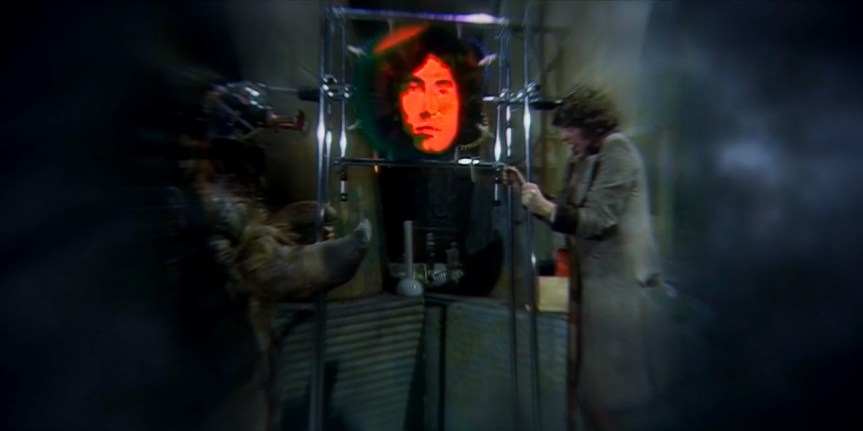
Because it wasn’t quite enough to make the show revolve around its own self-veneration. No. It was never enough. As if to add insult to injury, after all that mindless pandering, we also very conspicuously get the Morbius Doctors spliced in.
Scratch that, there’s no ‘as if’ about it.
The Morbius Doctors were what occurred, one time, when the production team took pictures of themselves in dress-up and had a go at claiming they were pre-Hartnell Doctors. This was something people no longer cared about in 2020. We, collectively, the fans and occasional writers of Doctor Who, had put the Morbius Docs back on the shelf; part of the process of mutually editing our cultural memory of the show. They were a quirk of the people who made The Brain of Morbius, and we were all largely at peace with that – nobody was demanding answers, those who really needed alternative explanations for the scene had plenty to choose from, and those who liked it just folded it into the catalogue of ambiguities surrounding the Doctor. It was over.
Chibnall doesn’t need to insert them into this sequence, of course – his inventions regarding the Timeless Child and Ruth’s pre-Hartnell-ness have already been exposited enough by now that everyone gets the gist – but for whatever reason, he cannot resist. They are deployed, dragged screaming back into the show, for the illusory legitimacy they lend the new retcon. “Thank goodness The Timeless Children finally solved the Morbius Doctors, the pressing mystery we’d all desperately wanted an answer to for decades! (Also thank goodness he revealed that the Cyber-Time-Lords were actually the Hybrid everyone was talking about in Series 9!)” Yeah.
It’s a spit in the face. Make no mistake, dredging up the Morbius Doctors is absolutely nothing more than a petty nerd dispute, lore dickwaving for wiki editors, but splattered across what’s supposed to be a flagship BBC drama.
Russell T Davies revived this show in 2005 so that it could speak to the imaginations of the whole country, perhaps even the world. It succeeded. It had a point of view on life – real life as experienced by people, not just imaginary facsimiles of life. Anyone could watch and participate.
Now, Doctor Who indulges itself in fixating on idiosyncrasies from the production of a 1976 serial, throwaway details that only a miniscule cross-section of the most monstrously depraved fan-cultists would see as holding any contemporary relevance. But that’s all that’s ever been happening here, isn’t it? The gradual process of the fetish replacing the meaning. The navel-gazing obsession with the contours of the familiar, and the desire to reproduce them indefinitely, drowning out all possibility of genuine newness. Lore over story. Returns over ideas. The dead rises to swallow the living. The putrid is elevated.
An acidic red patch burns viciously through the centre of the image and in this instant, only now, do I realise NuWho is dead. The show may carry on, for years even, but the dream has ended. The snake has feasted on its own tail, and only the twitching disembodied head remains amid a ring of vomited entrails. We couldn’t come back from this moment even if we deserved to.
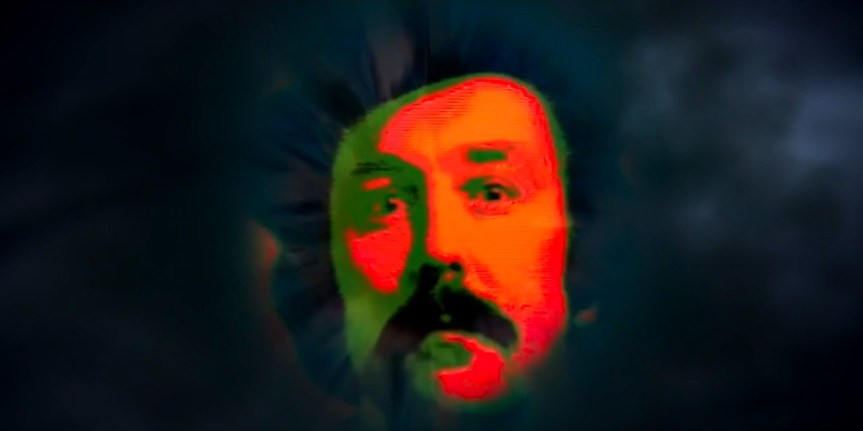

On the Morbius explanation – I look forward to Chibnall’s S13 finale finally making sense of Hartnell’s apparent fourth-wall break in The Feast of Steven.
Also, please don’t stop writing about the show!
LikeLiked by 1 person
Haha, love this. So nihilistic. You mentioned the Chibshow Resolution blog post, is that up here somewhere?
LikeLike
Alas, it seems to be trapped in the sodding Time Vortex…I’m sure it’ll turn up eventually. These posts aren’t always a strict progression of cause to effect. ¯\_(ツ)_/¯
LikeLike
you put it so perfectly. the show has become so obsessed with its own lore it’s cannibalised itself
LikeLike
This is mostly good stuff but I’m going to hard disagree on your assessment of the Master. How have we had downgrade from when Missy, when having “no raison d’etre outside of reacting to things about the Doctor” was the best way to describe her?
Until her, the Master had ambitions other than the Doctor, as stupid as the Timeless Children was at least they remembered that the Master would be quite pleased with having an army. While I liked her arc overall, I fail to see how I just want us to be friends is any more interesting than identity crisis and deep-seated insecurity now made center stage. The latter made more sense to me and was more consistent with the Master’s character.
I didn’t think the, he wants to die scene wasn’t just because he’s DAMAGED but because he’s been fighting to make himself superior for all these years and now the Doctor’s outshot him in a way that is almost impossible to beat so what’s the point?
How could you describe the scenes where she makes out with the Doctor or calls him her boyfriend or says “show a bad girl how it’s done” for anything other than horny hamminess and “played straight Curse of Fatal Death”?
Aside from that I mostly agree. I lost any optimism for the show after Timeless Children.
LikeLike
Wow, say what you really think Ben.
I should have stressed this is only regarding Missy in S8. Doctor Falls is the best Master story ever.
LikeLike
Yeah, it’s still a bad take Ben. Even in S8 Missy was the most compelling version of the Master since Roger Delgado.
LikeLike
> “Well, after being mind-wiped and reverted to a child, he just happened to do all of these Ruthesque things again, see, it still makes sense if you read these pages on TARDIS Data Core…you could say he was fated to do it because, uhh…”
It reminds this American of Edgar Rice Burroughs’ character Tarzan, written over a century ago. The idea that, even though raised by apes, he would still become an admirable, estimable adult…because, of course, his parents were British aristocrats, and blood will tell, right?
The idea that our bloodline determines our quality (see what I did there?) is very old, and I thought by now, very discredited. Or is the British class system still that alive and, uh, “well”?
> So the exceedingly unfortunate implication here is “they’re servants, nobodies, they would never have expressed anything important or worthwhile, their existences had no impact on their surroundings, thus their deaths don’t even qualify as a ripple”, which is about as classist a sentiment as you’re likely to find anywhere in Who.
Fits in well with my inference above, though.
> And if you don’t meet that qualification you just don’t matter.
Bingo.
I keep saying it, but I’ll do so again. These essays are so brilliant, so worth returning to again and again. They’re like the Moffat era, each revisit I get something else from them. Thank you once more for producing them.
LikeLiked by 1 person